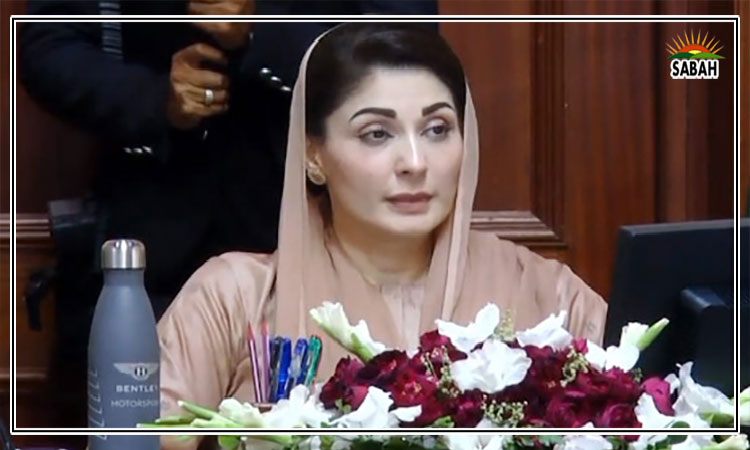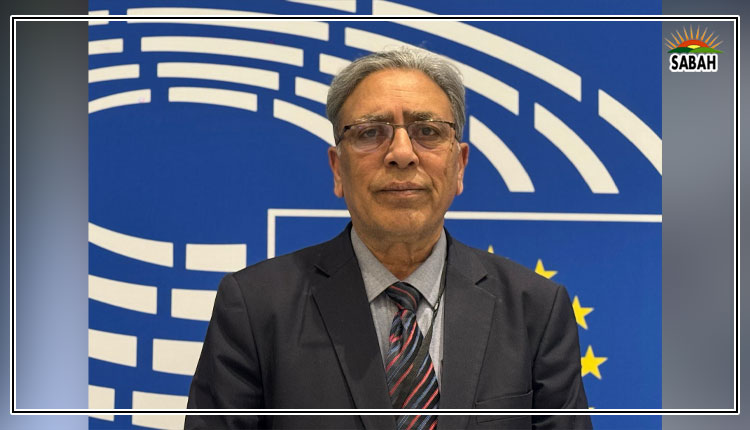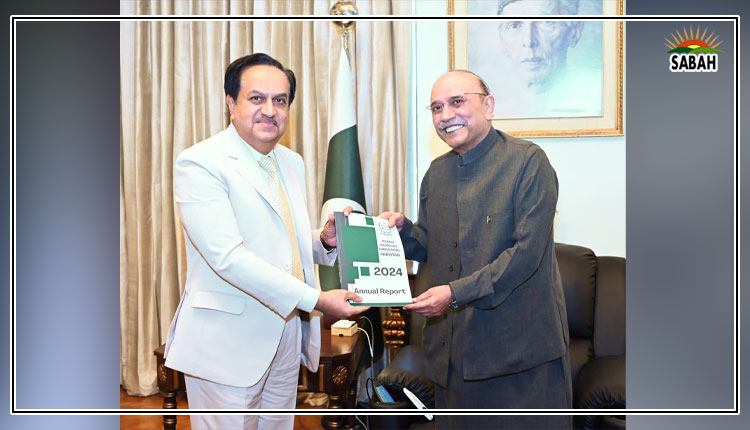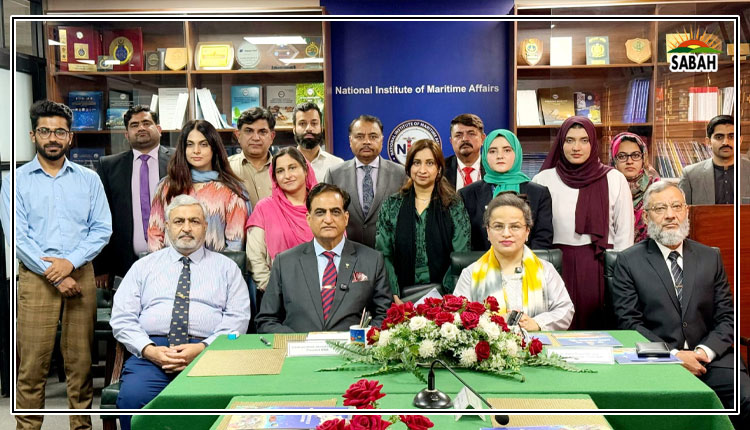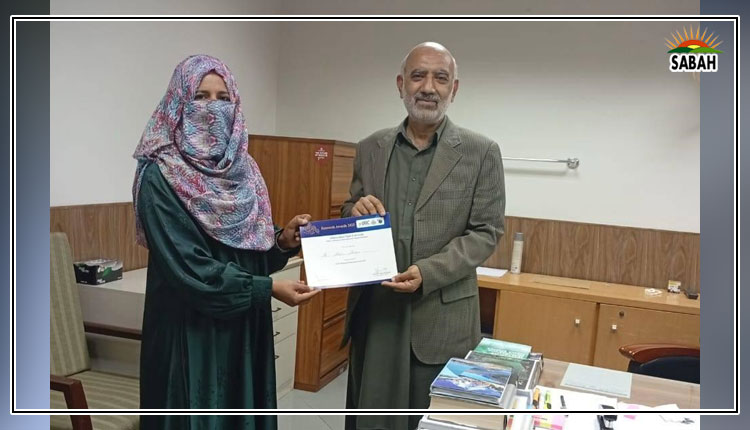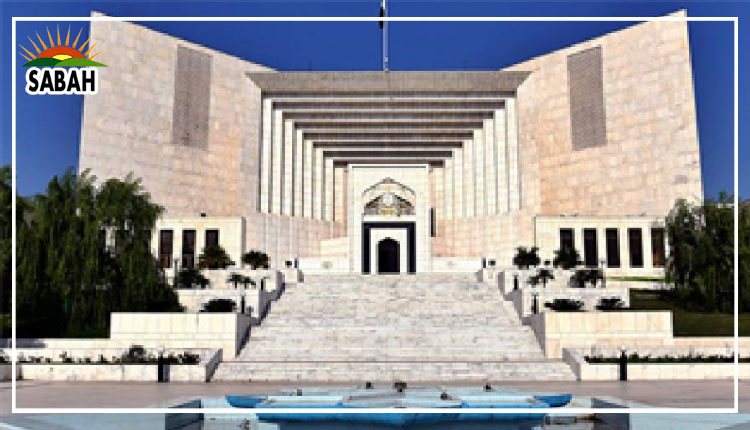Speaker can reject a resolution as per the Assembly rules: Justice Muneeb Akhtar
ISLAMABAD, April 04 (SABAH): A speaker can reject a resolution as per the Assembly rules, Justice Muneeb Akhtar of the Supreme Court of Pakistan said during the hearing of the suo motu notice on the constitutional crisis triggered after National Assembly deputy speaker ruled the no-confidence resolution against Prime Minister Imran Khan “unconstitutional.” Meanwhile the court has adjourned the hearing of the case till today (Tuesday) at 12:00 PM.
A five-member larger bench of the apex court, headed by Justice Umar Ata Bandial and comprising Justice Ijazul Ahsan, Justice Mazhar Alam Khan Miankhel, Justice Munib Akhtar and Justice Jamal Khan Mandokhel resumed hearing on the notice taken by CJP Bandial.
At the outset of the hearing, PPP’s counsel Senator Farooq Hamid Naek requested to the court to form a full-court bench to hear the case.
“The court should form a full-court bench for [this] important constitutional matter,” Naek said.
Responding to Naek’s request, CJP Bandial remarked that the bench would wrap up if Naek says he doesn’t have confidence in anyone.
The chief justice inquired if Naek would like to share which of the constitutional questions need the formation of a full-court bench.
“Looking into the constitutional questions is the court’s job. You tell what is the basis of your case. “The full-court bench held 66 hearings on a case for two years. 12 thousand cases piled up due to full-court bench hearings,” the top judge remarked.
The top judge went on to say that one full-court bench caused a backlog of one million cases.
The court will let you know if a full-court bench is needed over the constitutional questions in the case, the CJP added.
Starting his arguments, Naek referred to Article 54(3) and said that the National Assembly session is supposed to be convened within 14 days after a motion is submitted.
“The no-trust motion was submitted on March 8, 2022, while the assembly session was called on March 25 instead of March 21. The NA deputy speaker adjourned session on March 25 after Fateha till March 28,” Naek said.
The speaker didn’t provide any reason for not convening the meeting till March 20 after the motion was submitted, he added.
At this, Justice Jamal Khan Mandokhel objected that Naek’s case involves the act of speaker in Sunday’s NA session. “Tell [me] if the speaker did right or wrong,” the judge asked Naek.
“Wouldn’t the resolution be dismissed if there are 100 members and of them 50 are in its favour and 25 are against it,” Justice Akhtar observed.
Meanwhile, Justice Ijazul Ahsan remarked that “no-confidence motion is not valid until the leave is not granted.”
Responding to these remarks, Naek argued that the speaker had permitted presenting the resolution of no-trust. CJP Umar Ata Bandial inquired what does it mean to grant leave.
The court inquired who allows presenting the resolution, the speaker or the House.
At this, Naek responded that the House allows presenting the resolution instead of the speaker.
“Does the speaker have the authority to disallow presenting the resolution and what happens if the speaker doesn’t allow it,” Justice Akhtar asked.
Meanwhile, CJP Bandial asked if April 3 wasn’t fixed for debate on the no-confidence motion.
“How could a date be fixed for direct voting without holding debate on the no-trust motion,” CJP asked, adding that debate must be done for three days before going towards voting as per the rules.
At this, Naek informed the court that the speaker didn’t allow debating on the motion despite PPP Chairman Bilawal Bhutto Zardari’s request.
“Not allowing debate is a procedural defect,” Justice Ahsan remarked at Naek’s response.
Discussing Sunday’s session, the court inquired under which rule did the speaker give the ruling?
Farooq Hamid Naek told the court that the speaker gives rulings under Rule 28.
At this, Justice Munib Akhtar remarked that only the speaker can give and take back the ruling under the rule mentioned by Naek.
“The speaker can give a ruling in the House or in his office,” the judge said.
He further stated that the speaker gives the deputy speaker the authority in written but the latter can only preside over a meeting of the Assembly.
During the hearing, CJP Bandial directed Naek to argue how the deputy speaker’s ruling is illegitimate.
Farooq H. Naek prayed to court that all eyes are on the Supreme Court so the case hearing should be completed today. In response, Justice Ijazul Ahsan said it is impossible to announce the verdict on the same day.
When PTI’s counsel Babar Awan took the rostrum, the chief justice said that he wanted to hear the petitioners first. “If you want to give a statement, you can,” Justice Bandial told Awan, who informed the court that the party was ready for the next election.
“The court will only review the speaker’s ruling, not political statements,” the chief justice remarked, reiterating that the court would give a “reasonable decision”.
Naek told the court that the requisition notice for the NA session and no-confidence motion were submitted on March 8. “The speaker was bound to convene the session within 14 days but the meeting was called on March 27,” he said.
However, Justice Mandokhail pointed out that the case did not concern when the NA session was summoned while Justice Akhtar said that the speaker had provided reasons for the delay. “You can argue whether the reasons provided were correct or incorrect,” Justice Akhtar told Naek.
After a brief hearing on Sunday, a written order was issued which said the court would like to “examine whether such an action (dismissal of the no-trust motion on the basis of Article 5) is protected by the ouster (removal from the court’s jurisdiction) contained in Article 69 of the Constitution.”
Article 69 of the Constitution essentially restricts the court’s jurisdiction to exercise authority on a member or officer of parliament with respect to the functions of regulating parliamentary proceedings or conducting business.
“No officer or member of Majlis-i-Shoora (parliament) in whom powers are vested by or under the Constitution for regulating procedure or the conduct of business, or for maintaining order in Majlis-i-Shoora, shall be subject to the jurisdiction of any court in respect of the exercise by him of those powers,” clause two of the Article reads.
The court also ordered all state functionaries and authorities — as well as political parties — to refrain from taking any advantage of the current situation and stay strictly within the confines of the Constitution.
The court had also directed the interior and defence secretaries to brief it on the law and order situation.
President Dr. Arif Alvi, the Supreme Court Bar Association and all political parties have been made respondents in the case.
A joint petition, filed by the PPP, PML-N and JUI-F through Farooq H. Naek, Azam Nazir Tarar and Kamran Murtaza, has also requested the apex court to declare the ruling of the deputy speaker, as well as the advice of the prime minister to the president to dissolve the National Assembly and the subsequent dissolution of the assembly as illegal and unconstitutional.



